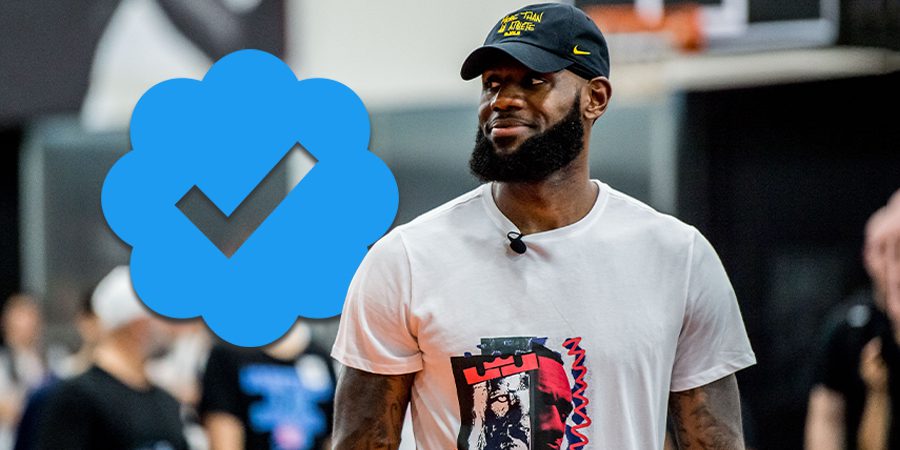In this article, we’ll look at the reasons behind the ongoing controversy of Twitter’s paid verification, and how Elon Musk stepped in to offer complimentary Twitter Blue subscriptions to LeBron James and other celebrities.
Key Takeaways:
- Twitter has started removing blue checkmarks from users who don’t pay for verification.
- LeBron James, Stephen King, and William Shatner were offered complimentary subscriptions on behalf of Elon Musk.
- James and other celebrities previously said they wouldn’t pay for verification, but still remain verified on Twitter.
- Twitter has been replying to press inquiries with a poop emoji for weeks.
LeBron James: From Paid Verification Hater to Complimentary Subscriber
LeBron James, NBA superstar and widely known as the face of the league, has been vocal about his opposition to Twitter’s paid verification model.
He has made it clear that he would not pay to keep the coveted blue checkmark on his profile.
However, recent events have taken a surprising turn, with James being offered a free subscription to Twitter Blue.
The situation began when Twitter decided to remove the blue checkmarks from accounts that did not pay for the verification.
This move sparked outrage among users, particularly among those who had already been verified before the introduction of the paid model.
LeBron James was one of the most prominent critics, insisting that he would not pay the fee required for verification.
In a surprising development, it was revealed that an employee at Twitter had emailed James, extending an offer of a complimentary Twitter Blue subscription on behalf of none other than Elon Musk. James, who had been adamant about not paying for verification, was now in a position where his blue checkmark would remain intact without any cost to him.
Elon Musk Personally Covers Celebrities’ Twitter Blue Subscriptions
Elon Musk, CEO of Tesla and SpaceX, and a well-known figure on Twitter, has decided to take matters into his own hands.
As the controversy over paid verification grew, Musk revealed that he would personally cover the cost of Twitter Blue subscriptions for a select few celebrities, including LeBron James, Stephen King, and William Shatner.
This unexpected move by Musk has generated mixed reactions.
While some have praised his decision to help these celebrities maintain their verified status, others argue that it further complicates the issue of fairness in Twitter’s verification system.
For example, Stephen King, the renowned author, had previously stated that he had not subscribed to Twitter Blue or provided the company with his phone number.
However, with Musk’s intervention, his account remains verified, and he doesn’t have to pay a dime.
Twitter’s Verification Controversy: Who Gets to Keep the Blue Checkmark?
The recent events surrounding Twitter’s paid verification system have raised several questions about the fairness and sustainability of this new model.
On one hand, Twitter has maintained that the verification process should be based on users paying for the privilege, but on the other hand, they are offering free subscriptions to select individuals.
When the story about LeBron James receiving a complimentary subscription became public, many called him a hypocrite for accepting the offer despite his previous stance against paid verification.
However, it was later confirmed that James had not actually accepted the offer, but his account remains verified, nonetheless.
The same goes for other celebrities like William Shatner, who had also expressed their disapproval of the paid verification system.
Yet, their accounts still retain the blue checkmarks, thanks to Elon Musk’s intervention.
As Twitter continues to remove blue checkmarks from users who refuse to pay, the question remains: who gets to keep the coveted symbol of verification?
The situation becomes even murkier when considering the fact that Twitter has been responding to press inquiries with a poop emoji for weeks, providing no clarity on their stance regarding the issue.
With the apparent preferential treatment being given to select celebrities, the fairness of Twitter’s verification system is now under scrutiny.
The debate over paid verification has only grown more intense, with many users questioning whether the blue checkmark should be available only to those who can afford it or if it should be based on merit.
While it is understandable that Twitter aims to monetize the verification process, the current situation has led to increased dissatisfaction among users.
The involvement of Elon Musk in providing free subscriptions to some celebrities further complicates the matter, leaving many to wonder if there will be a more equitable solution in the future.
As the debate rages on, it is important for Twitter to address the concerns of its users and establish a clear and fair verification system.
This may involve reevaluating their approach to paid verification and developing a more transparent set of criteria for determining who gets to keep the blue checkmark.
Ultimately, the fairness and sustainability of Twitter’s verification system will depend on their ability to balance the need for monetization with the desire to maintain credibility and trust among their user base.
Until a more equitable solution is found, the controversy surrounding the blue checkmark is likely to continue.
 Sections of this topic
Sections of this topic
















